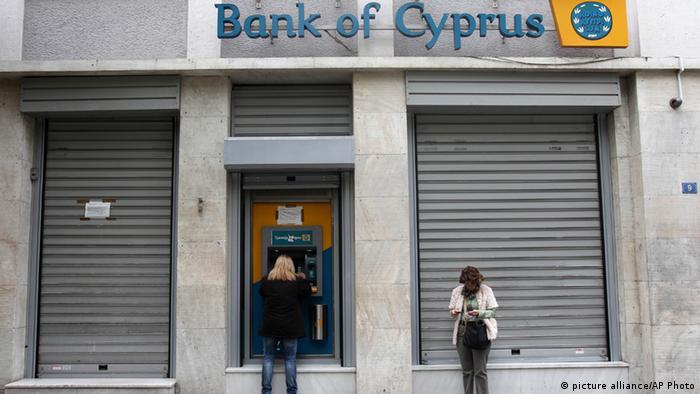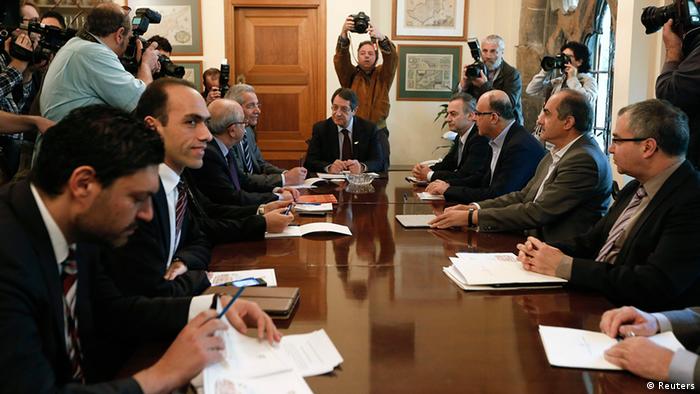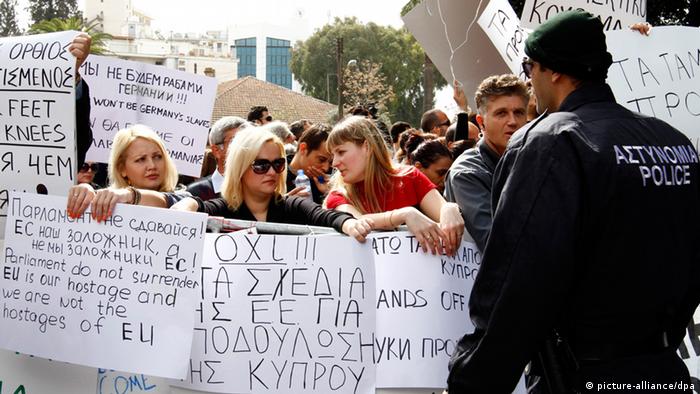The banks of Cyprus could soon face bankruptcy, dragging the rest of the country with them. But how did it come to this, and what means of rescue could the Cyprus government still reach for?
The tax haven Cyprus bears much, but not all, of the responsibility for the financial disaster it is currently seeking to stem. The island country can partly ascribe its financial problems to its close linkage with the Greek economy. Cypriot banks invested heavily in Greece, providing loans that didn't get paid back after Greece's creditors agreed to take losses in early 2012.
This particularly affected Cyprus' economy since its banking sector is disproportionately large and influential. With deposits of 70 billion euros ($91 billion) compared to a gross national product of around 18 billion euros, the banking sector is considered overinflated. This represents a key difference to other eurozone countries.
Drumming up 17 billion euros
Experts say that this disparity was the result of the Mediterranean nation's longstanding enticement of cash-rich investors - including wealthy Russians, Ukrainians, Brits and Greeks - by way of low taxes, high interest rates and lax controls. Lack of banking supervision is believed to have drawn illegal Russian money into Cyprus, as well, leading to accusations from European Union politicians that Cyprus hasn't done enough to combat money laundering.
Besides the bank crisis, the country is also plagued by high sovereign debt. A bloated and well-paid bureaucracy is understood to have contributed to this. The Cypriot government, in attempting to gain a handle on the situation, had applied for eurozone bailout funds last summer.
At this point, the figure of 17 billion euros ($22 billion) is being cited to fill the gap - an amount nearly as high as the country's entire economic output. As the two largest banks in the country teeter on insolvency, the European Central Bank (ECB) has been keeping the financial system afloat with emergency loans.
Avoiding a cash run
The EU, ECB and International Monetary Fund have offered up 10 billion euros in financial assistance. But in order to receive these funds, the Cypriots themselves must bring 5.8 billion euros to the table. EU finance ministers had proposed, among other things, that Cyprus seize funds from people's bank accounts to cover this amount - but the Cypriot parliament rejected the proposal.
The Cypriot government is currently working on its own bailout plan. Measures include a "solidarity fund" drawing on the state pension system and contributions from the Orthodox Church. In addition, the state has sought to limit the movement of capital, including by capping cash withdrawals by Cypriot bank customers.
If bank customers were to storm the banks and withdraw all their capital, this would greatly intensify the crisis. Although many Cyprus banks have been closed - partly to avoid such a cash run - this cap is to continue to apply after banks reopen in the coming weeks.
Apparently, the bailout proposals again include the possibility of seizing funds from bank accounts, but the Cypriot parliament would still have to approve such a move. Savings accounts at Cyprus Bank, the country's second largest bank, with balances of greater than 100,000 euros would likely be affected. Cyprus Bank is where the most foreign funds are being held. State-funded television has reported that bank customers there could face levies of up to 22 to 25 percent.
As to when a decision will come, and whether or not this will involve bank customers' funds, remains unclear. Cyprus has until Monday to figure out what to do, as the ECB has announced it's intending to cut off emergency loans to the country by March 25. dw de
As to when a decision will come, and whether or not this will involve bank customers' funds, remains unclear. Cyprus has until Monday to figure out what to do, as the ECB has announced it's intending to cut off emergency loans to the country by March 25. dw de



Comments